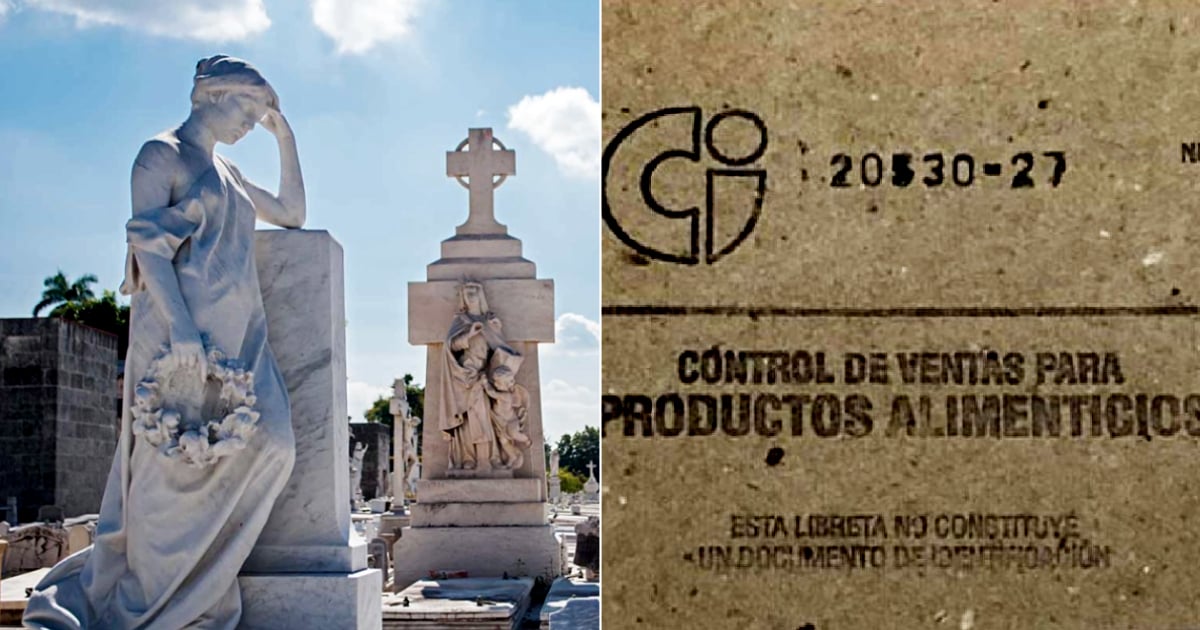The administration led by Miguel Díaz-Canel has declared the permanent end of the "libreta" ration book, a food rationing system that has been in place for over six decades. This decision signals the conclusion of an era but also amplifies concerns regarding food access amidst inflation, scarcity, currency devaluation, low wages, and the strengthening of repressive mechanisms by a violent and totalitarian regime.
Originally introduced by dictator Fidel Castro in 1962, the "libreta" was intended to ensure equitable distribution of basic goods during the early days of the U.S. embargo. Over the years, it provided rations of essentials like rice, meats, sugar, dairy, coffee, tobacco, oil, and beans. However, its scope and effectiveness have drastically diminished due to Cuba's faltering economy and the regime's inability to maintain supplies.
Inconsistent Promises and Economic Struggles
In recent years, high-ranking officials, since 2018, had indicated plans to dismantle the "libreta," promising that this would only occur under favorable economic conditions. In 2020, Marino Murillo Jorge, then in charge of economic guidelines, stated that "the dismantling of the ration book will occur when the economy permits." Yet, the system's removal in 2024 contradicts these claims amid severe economic turmoil, characterized by rampant inflation and the collapse of the Cuban peso.
Recent years have seen several provinces cutting back on "libreta" products, ranging from the removal of milk for certain groups to substituting essential foods with alternatives like syrup and chocolate mixes. These adjustments foreshadowed the end of the organized rationing system, leaving Cuban families reliant on informal markets and dollar stores.
Impact on the Cuban Population
The loss of the "libreta" intensifies an already critical situation for millions of Cubans. For many, these subsidized rations were the only assurance of a minimal food intake in a country where wages don't cover informal market prices. The progressive dollarization of commerce has created an unbridgeable gap between those with access to foreign currency and those without.
"It wasn't much, but it was reliable," citizens expressed on social media, where outrage quickly spread. "They're taking away the only thing that ensured some food every month," one user lamented. Criticisms also focus on the absence of a clear plan to replace the system and support "vulnerable people." Without the "libreta," many families face the challenge of acquiring food at exorbitant or nonexistent prices in state-run markets.
A Step Towards Market Liberalization?
The government justifies ending the "libreta" as part of a strategy to "modernize" the economy and cut state expenses. However, experts argue that this move reflects more of the regime's inability to sustain the system than a genuine structural reform. The decision also appears to align with a gradual shift towards market models, albeit without necessary social safeguards for the most vulnerable sectors.
Since Díaz-Canel's appointment as Cuba's leader, authorities have advocated for a "necessary change," yet the implementation of these policies reveals a disconnect between official goals and public needs. The end of rationing marks the demise of a system that, despite its flaws, served as a safety net amid an unparalleled economic crisis.
An Uncertain Future
The termination of the "libreta" signifies not just the end of a distribution system but also the symbolic abandonment of a "revolutionary promise": the guarantee of basic food for all. As the government insists that ending rationing is a step towards efficiency, millions of Cubans face an uncertain future where survival depends more than ever on access to dollars and ingenuity to navigate an increasingly unequal economy.
Fluctuating Policies and Broken Promises
Since 2010, the Cuban government has oscillated between defending the "libreta" as essential and targeting its elimination as an economic modernization goal. Officials previously claimed that dismantling would be gradual and contingent on economic strengthening, a promise never fulfilled. In 2018, amid relative stability, authorities insisted that "conditions didn't exist" to eliminate the system, yet product availability was already shrinking.
By 2020, rhetoric shifted again, suggesting the "libreta" would be replaced by a regulated market model, a promise that fell through due to the pandemic-worsened economic collapse. In 2023, despite denying rumors of its removal, restrictions foreshadowing its end began, with staples like rice, oil, and milk growing scarce, pushing Cubans further into dollar stores, inaccessible to much of the population.
The abolition of the ration book marks a pivotal moment in Cuba's economic and social history. Beyond official justifications, the end of this system underscores the regime's failure to ensure food security for its people. Without a clear replacement plan, Cubans face a future fraught with uncertainty, where access to basic goods depends on their ability to adapt to an increasingly unequal market.
Key Questions About Cuba's Economic Transition
Why is the "libreta" being eliminated now?
The Cuban government claims the removal is part of an economic modernization strategy, though many experts see it as a reflection of the regime's inability to sustain the system amid severe economic challenges.
What was the purpose of the "libreta" system?
The "libreta" was designed to ensure equitable distribution of essential goods across Cuba, originally introduced during the U.S. embargo as a means to manage scarce resources.
How will the end of the "libreta" affect Cuban citizens?
The end of the "libreta" will likely increase reliance on informal markets and dollar stores, exacerbating economic inequalities and making access to food more difficult for many Cubans.
